Speaker
Description
We explore the parameter space of the phenomenological Minimal Supersymmetric Standard Model (pMSSM) with a light neutralino thermal dark matter (M ̃χ01 ≤ Mh/2) that is consistent with current collider and astrophysical constraints. We identify that a narrow region with light Higgsinos having masses between 125-160 GeV survives the present constraints for the μ < 0 scenario, including the electroweakino searches implemented in recast frameworks like SModelS and CheckMATE, where μ is the Higgsino mass parameter. This hints towards either a gap in the present LHC searches or the unavailability of its proper recasting. We select benchmarks from this region, and our analysis using the machine learning framework of XGBOOST shows that these are well within the reach of the Run-3 of LHC, and dedicated efforts to probe this region should be pursued. We observe that the recent experimental results from the LHC and direct detection searches for dark matter by the LUX-ZEPLIN collaboration put the μ > 0 scenario under severe tension. We further investigate the impact of light staus on the parameter space, provide benchmarks that can be interesting for Run-3 of LHC, and analyse these benchmarks at the LHC using XGBOOST. Finally, we also discuss the effect of non-standard cosmology on the parameter space.
